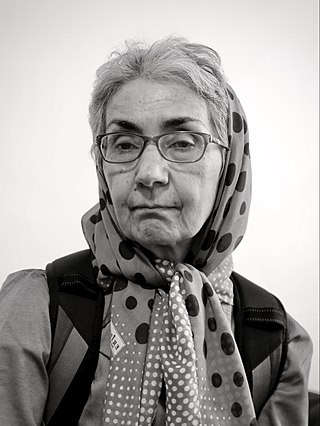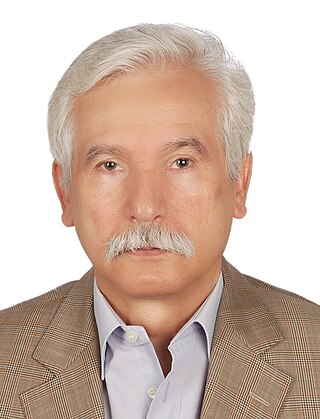Related Research Articles
Throughout history, women in Iran have played numerous roles, and contributed in many ways, to Iranian society. Historically, tradition maintained that women be confined to their homes so that they could manage the household and raise children. During the Pahlavi era, there was a drastic social change towards women's desegregation: ban of the veil, right to vote, right to education, equal salaries for men and women, and the right to hold public office. Women were active participants in the Islamic Revolution. Iran's constitution, adopted after the Islamic Revolution in 1979, proclaims equality for men and women under Article 20, while mandating legal code adhering to Sharia law. Article 21 of the constitution as well as a few parliament-passed laws give women rights such as women are allowed to drive, hold public office, and attend university but not wearing a veil in public can be punished by law; and when in public, all hair and skin except the face and hands must be covered. However, this is not practiced effectively; particularly in recent years, Iranian women have created many movements to fight back against the restrictive laws by the government and gain back their rights and freedom.

Masoumeh Ebtekar is an Iranian reformist politician, who was the Vice President of Iran for Women and Family Affairs, from August 9, 2017, to September 1, 2021. She previously headed Department of Environment from 1997 to 2005, making her the first female member in the cabinet of Iran since 1979 and the third in history. She held the same level of office from 2013 to 2017. She is a full professor at Tarbiat Modares University in the School of Medical Sciences, Immunology Department.
Gender roles in Islam are based on scriptures, cultural traditions, and jurisprudence.

Abdolhossein Hazhir was an Iranian politician who served as the Prime Minister of Iran under Mohammad Reza Pahlavi in 1948, having been a minister 10 times. One of his posts was the minister of finance.
Gender segregation in Islamic law, custom, law and traditions refers to the practices and requirements in Islamic countries and communities for the separation of men and boys from women and girls in social and other settings.

Afsaneh Najmabadi is an Iranian-born American historian, gender theorist, archivist, and educator. She is the Francis Lee Higginson Professor of History and of Studies of Women, Gender, and Sexuality at Harvard University.

Sex segregation in Iran encompasses practices derived from the conservative dogma of Shiite Islam currently taking place in Iran. Most areas of the country are segregated by sex, except universities. In many cities, there are women parks. Sex segregation prohibits males from viewing females, and age of consent laws do not exist, as all sexual activity outside marriage is illegal.
Eric James Hooglund is an American political scientist and an expert on contemporary Iran. Since 2010 he has been a Senior Research Professor at the Center for Middle Eastern Studies at Lund University in Sweden.
Fatemeh Amini is a female religious leader of Iran, who has directed and opened a number of women's seminaries in Qom and Tehran.
Minoo Moallem is an Iranian-born American educator, author, and scholar. She is a Professor of Gender and Women’s Studies at the University of California at Berkeley. Her academic specialties are transnational and postcolonial feminist studies, religious nationalism and transnationalism, consumer culture, immigration and diaspora studies, Middle Eastern Studies and Iranian films, cultural politics. She is best known for her work on Islamic nationalism and fundamentalism as byproducts of colonial modernity and modernization of patriarchies.

The International Association for Feminist Economics (IAFFE) is a non-profit international association dedicated to raising awareness and inquiry of feminist economics. It has approximately six hundred members in sixty-four countries. The association publishes a quarterly journal entitled Feminist Economics. Since 1998 IAFFE has held NGO special consultative status.
Martha Lorraine MacDonald is the professor of economics in the department of economics, St Mary's University, Halifax, Nova Scotia, Canada, and was the president of the International Association for Feminist Economics (IAFFE) from 2007 to 2008.

On 8 January 1936, Reza Shah of Iran (Persia) issued a decree known as Kashf-e hijab banning all Islamic veils, an edict that was swiftly and forcefully implemented. The government also banned many types of male traditional clothing. The ban was only enforced for a period of five years (1936-1941), however, since then, the hijab issue has become controversial in Iranian politics. One of the enduring legacies of Reza Shah has been turning dress into an integral problem of Iranian politics.
The Principlists, also interchangeably known as the Iranian Conservatives and formerly referred to as the Right or Right-wing, are one of two main political camps inside post-revolutionary Iran, the other being Reformists. The term hardliners that some western sources use in the Iranian political context usually refers to the faction, although the principlist camp also includes more centrist tendencies.

The "Zeynab Society (S.A.A)" is an Iranian traditional principlist all-female political, cultural and advocacy group affiliated with the Front of Followers of the Line of the Imam and the Leader. It is known for leading a parliamentary group of women in 1980s–1990s, as well as lobbying for gender issues within an Islamic prism.

Formal education for women in Iran began in 1907 with the establishment of the first primary school for girls. Education held an important role in Iranian society, especially as the nation began a period of modernization under the authority of Reza Shah Pahlavi in the early 20th century when the number of women's schools began to grow. By mid-century, legal reforms granting women the right to vote and raising the minimum age for marriage offered more opportunities for women to pursue education outside the home. After periods of imposed restrictions, women's educational attainment continued its rise through the Islamification of education following the Iranian Revolution of 1979, peaking in the years following radical changes in the curriculum and composition of classrooms. By 1989, women dominated the entrance examinations for college attendance.

Vice Presidency for Women and Family Affairs is a cabinet-level position in Iran, headed by one of the vice presidents.

Fashion and clothing in Iran is divided into several historical periods. The exact date of the emergence of weaving in Iran is not yet known, but it is likely to coincide with the emergence of civilization. Clothing in Iran is mentioned in Persian mythology. Ferdowsi and many historians have considered Keyumars to be the inventor of the use of animals' skin and hair as clothing. Some historians have also mentioned Hushang as the first inventor of the use of living skins as clothing. Ferdowsi considers Tahmuras to be a kind of textile initiator in Iran. There are historical discoveries in northern Iran from about 6,000 BC that refer to wool weaving at the time. Other discoveries in central Iran dating back to 4200 BC have shown that the animals' skin has not been the only clothing worn on the Iranian plateau since those years. The clothing of ancient Iran took an advanced form, and the fabric and color of clothing became very important at that time. Depending on the social status, eminence, climate of the region and the season, Persian clothing during the Achaemenian period took various forms. The philosophy used in this clothing, in addition to being functional, also had an aesthetic role.

Mostafa Azkia is an Iranian sociologist. Azkia is a major figure in the study of Iranian rural development. He is a professor of sociology at the University of Tehran.. He is the author and translator of about 20 books. His chapter in Twenty Years of Islamic Revolution: Political and Social Transition in Iran since 1979 edited by Eric Hooglan, titled Rural Society and Revolutionin Iran is considered to be seminal work in this area. He is considered to be one of the founding fathers of rural development studies in Iran.

Payam-e-Hajar was an Iranian nationalist-religious periodical publication in magazine-format that focused on current sociopolitical affairs of Iran. Founded by Azam Taleghani in 1979, it was considered a forum for reform-minded Muslims and was banned in April 2000.
References
- ↑ "Bahramitash, Roksana". Virtual International Authority File.
{{cite web}}: CS1 maint: url-status (link) - ↑ Bahramitash, Roksana. "Gender and Entrepreneurship in Iran Microenterprise and the Informal Sector". About the Author. Palgrave Macmillan.
- ↑ McQueen, Carol (October 10, 2002). "Exploring Female Employment in the Muslim World" (PDF). Concordia's Thursday Report. Retrieved April 25, 2021.
{{cite web}}: CS1 maint: url-status (link) - ↑ "Concordia University".
- ↑ "Beyond the Bourqa". MEHODUDE via YouTube. February 11, 2009.
- ↑ McQueen, Carol (October 10, 2002). "Exploring female employment in the Muslim world". Concordia's Thursday Report Online. Concordia University.
- ↑ Proactive disclosure for grants and contributions, Social Sciences and Humanities Research Council of Canada, April 1, 2006
- ↑ Bahramitash, Roksana (2005). Liberation from liberalization gender and globalization in Southeast Asia. London New York City: Zed Books. ISBN 9781842774397. (Reprinted by Books for Change in 2008)
- ↑ Bahramitash, Roksana; Esfahani, Hadi Salehi (2011). Veiled employment: Islamism and the political economy of women's employment in Iran . Syracuse, New York: Syracuse University Press. ISBN 9780815632139.
- ↑ Bahramitash, Roksana; Hooglund, Eric (2011). Gender in contemporary Iran pushing the boundaries. New York: Routledge. ISBN 9780415781015.
- ↑ "Education about Religions & Beliefs: Partners: Canada Research Chair on Islam, Pluralism, and Globalization (CRC-IPG), University of Montreal, Canada". United Nations Alliance of Civilizations. December 10, 2011.